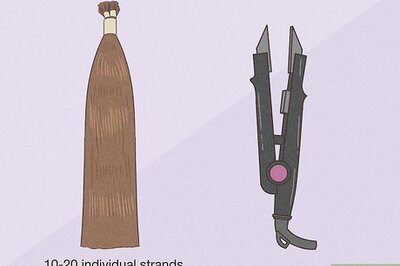
views
If you're sexually active (or planning to be sexually active) and do not wish to get pregnant in the near future, you must know about your options in terms of contraceptives. Contraception is a term used for the methods that are used to prevent unwanted pregnancies. Contraceptives are available in the form of devices, pills and injections.
While some of the contraceptives prevent the entry of sperm into the uterus, others just diminish their ability to swim to the uterus. Of all these, only condoms can help prevent the transfer of sexually transmitted diseases as well.Barriers methods
Barriers include condoms, spermicides, diaphragms and cervical caps. Condoms are the most popular mode of contraception amongst people. They are easily available and are 98% effective (given proper use) in preventing pregnancy. They also help prevent sexually transmitted disease. There are two types of condoms available - male and female.
A spermicide is a gel which can be inserted into the vagina, 30 minutes prior to the intercourse. It has the ability to kill the sperm. It is about 70-80% effective in preventing pregnancy.
Diaphragms are flexible cups which are made of latex and are inserted into the vagina to block the sperm from before entering the uterus. With perfect use, they can be 94% effective.
Cervical caps are similar to diaphragms but are more rigid and are made of silicone. They also block the sperm from entering the uterus. They are said to be 88% effective but this estimate may be less if you've given birth vaginally before.Hormonal birth control
In the hormonal methods of birth control, the doctors give hormones to the women to regulate or stop their ovulation, thus preventing pregnancy. Injections of depot medroxyprogesterone acetate [DMPA] are given every three months to prevent pregnancies and have an effectiveness of 99%.
Combination (containing synthetic forms of progestin and estrogen) and progestin-only pill (POP) are hormonal birth control methods which need to be taken on a daily basis in the form of a pill. They both thicken the cervical mucus, making it difficult for the sperm to swim. Combination pills also prevent your body from ovulating. With perfect use, birth control pills can be 99% effective.
Another hormonal birth control method is a vaginal ring which is inserted into the vagina and works by releasing the hormones ethinyl estradiol and progestin that prevent pregnancy. The vaginal ring is used for three weeks and a new one is inserted after a break of one week. Used correctly, it can be 99% effective.Intrauterine devices
An intrauterine device is used to avoid pregnancy for a long period of time, say five years. An intrauterine device (IUD) is a small T-shaped device that is inserted into the uterus by a medical professional. The most commonly used IUD is copper-T which either kills the sperm or changes its way, thus preventing pregnancy. It is known to be about 99% effective in preventing pregnancies.Emergency contraceptive pills
The emergency contraceptive pills are taken by the woman after unprotected sexual intercourse. The pills are either taken as a single dose or two doses 12 hours apart. They can thicken the cervical mucous making it difficult for the sperm to swim. They are about 95% effective in preventing pregnancy when taken on time. They are not recommended for regular use.Surgeries
Surgeries can be a sort of permanent contraception as it can prevent a woman from getting pregnant and can also prevent a man from releasing sperm. Tubectomy is a surgery done in women, where the surgeon ties the fallopian tube, thus preventing the eggs from reaching the uterus. Vasectomy is a surgery done in men, where the surgeon ties the vas deferens which prevents the release of sperm from the testes.For more information, read our article on Birth control methods.Health articles on News18 are written by myUpchar.com, India’s first and biggest resource for verified medical information. At myUpchar, researchers and journalists work with doctors to bring you information on all things health.Follow @News18Lifestyle for more


















Comments
0 comment